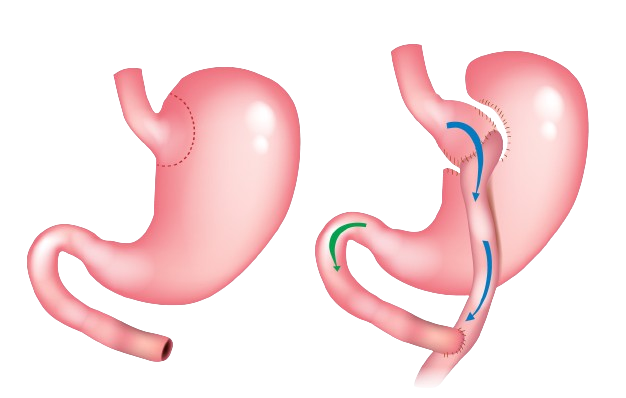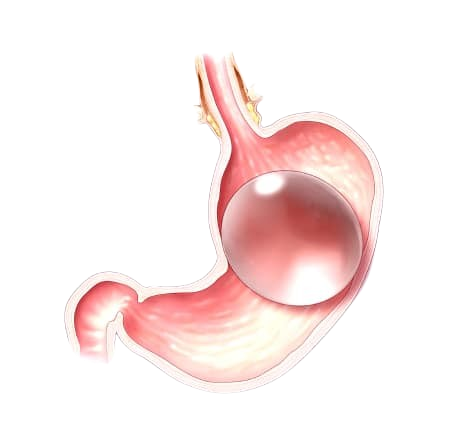
Bariatric (Obesity) surgeries
Bariatric (Obesity) surgeries are considered for individuals with obesity if they meet the following criteria:
They have a Body Mass Index (BMI) of 40 kg/m² or above, or 35 kg/m² or above with other significant diseases like type 2 diabetes or high blood pressure that could be improved with weight loss.
To calculate BMI, divide weight (in kilograms) by height (in meters) squared:
Weight ÷ height ÷ height. For example, 120 kg ÷ (1.70 m)^2 = 41.5 BMI.
The three most common operations for weight loss are:
Gastric bypass, Gastric Sleeve and Gastric balloon
Each surgery has its own set of pros and cons, and none of them provide a quick, simple solution for weight loss.

Gastric bypass surgery
Gastric bypass surgery is a type of bariatric (weight-loss) surgery that involves making changes to the digestive system to help people lose weight. During gastric bypass surgery, the surgeon creates a small stomach pouch by stapling or dividing the stomach and then connects this pouch directly to the small intestine, bypassing a portion of the stomach and the first part of the small intestine.
This procedure restricts the amount of food that can be eaten at one time and reduces the absorption of nutrients, leading to weight loss. Additionally, the rerouting of the digestive system can also affect hormones related to hunger and satiety, further aiding in weight loss.
Gastric bypass surgery is typically recommended for individuals with severe obesity (usually a body mass index, or BMI, of 40 or higher) or those with a BMI of 35 or higher who have obesity-related health problems such as type 2 diabetes, high blood pressure, or sleep apnea. It is usually considered after other weight-loss methods, such as diet and exercise, have been unsuccessful.
While gastric bypass surgery can be highly effective in helping individuals lose a significant amount of weight and improve or resolve obesity-related health conditions, it also carries risks and requires lifelong commitment to dietary and lifestyle changes. Common risks and potential complications include infection, blood clots, hernias, gallstones, and nutritional deficiencies.
More about Gastric bypass surgery:
- Accommodation in Istanbul: 7-8 days
- Anesthesia: general
- laparoscopic technique
- Average operation duration: 55 – 60 minutes
- The healing period: about a week
- Side effects: In some cases, lack of vitamins which could be compensated by taking vitamins
- Risk: severe loss of weight
- The final result: between 5 to 9 months

Gastric sleeve surgery
Gastric sleeve surgery, or sleeve gastrectomy, involves removing a large portion of the stomach to create a smaller, tube-shaped stomach. This procedure is typically performed laparoscopically.
This restricts food intake, leading to weight loss. It’s effective for people with a BMI of 40 or above, or a BMI of 35 or above with obesity-related health issues.
Benefits include significant weight loss and improvement in conditions like diabetes and hypertension. However, risks include bleeding, infection, and long-term nutrient deficiencies. Commitment to lifestyle changes is crucial for long-term success.
More about Gastric sleeve surgery:
- Accommodation in Istanbul: 7-8 days
- Anesthesia: general
- Average operation duration: 55 – 60 minutes
- The healing period: about a week
- Side effects: In some cases, lack of vitamins which could be compensated by taking vitamins
- The final result: between 5 to 9 months
How many percent of the stomach will be removed during the Gastric sleeve surgery?
- BMI> 30 – 40 about 50%
- BMI>40 about 70%
- If BMI 25<BMI>30 about 30-45 (Fundectomy)

Gastric balloon
Gastric balloon is a non-surgical weight loss procedure where a deflated balloon is inserted into the stomach and then inflated with 400-700 cc of saline water, creating a feeling of fullness and reducing hunger.
Gastric balloon is typically used for temporary weight loss and is removed after a period ranging from 6 months and 1 year.
This method does not apply to gastric ulcers, large stomach hernias, and pregnancy situations. The patient leaves the hospital 2 hours after the operation. This procedure can be an option for individuals who are not eligible for or prefer to avoid surgery. However, it requires adherence to a diet and lifestyle changes for lasting results. Common side effects include nausea and discomfort.
Important: Gastric balloon is not performed for patients with stomach ulcers
More about Gastric balloons:
- Accommodation in Istanbul: 3 days
- Time of Operation: 25 minutes. Anesthesia: Local
- The healing period: on the same day
- Side effects: Nausea, pain, fatigue
- The final result: between 6 months to 9 months
FAQs about Bariatric (Obesity) surgeries:
What are the Bariatric (Obesity) surgeries?
Bariatric (Obesity) surgeries refer to a group of surgical procedures designed to help individuals lose weight by making changes to the digestive system.
Who is a candidate for Bariatric (Obesity) surgeries?
Candidates for Bariatric (Obesity) surgeries typically include individuals with a body mass index (BMI) of 40 or higher, or a BMI of 35 or higher with obesity-related health conditions such as diabetes or high blood pressure.
What are the different types of Bariatric (Obesity) surgeries?
The most common types of Bariatric (Obesity) surgeries include Gastric bypass, Gastric Sleeve, and Gastric balloon
What are the potential risks and complications associated with Bariatric (Obesity) surgeries?
Risks and complications of Bariatric (Obesity) surgeries may include infection, blood clots, bleeding, leakage at surgical sites, nutritional deficiencies, and gallstones, among others.
What is the recovery process like after Bariatric (Obesity) surgeries?
Recovery after Bariatric (Obesity) surgeries varies based on the procedure and the patient’s health. Hospital stays range from 5 hours to 2 days post-op. After discharge, patients gradually resume normal activities with a modified diet. Recovery duration, typically 1-5 days, depends on the surgical approach, existing health conditions, and individual response.
How much weight can I expect to lose after Bariatric (Obesity) surgeries?
Weight loss outcomes vary, but individuals can typically expect to shed a substantial amount of excess weight within the first year after surgery. This can range between 8 to 20 kilograms per month, contingent upon factors such as metabolism, adherence to post-operative instructions like diet and exercise, and individual body specifications.
Will I need to make lifestyle changes after Bariatric (Obesity) surgeries?
Yes, lifestyle changes including adopting a healthy diet and regular exercise are essential for long-term success after Bariatric (Obesity) surgeries.
Are there any dietary restrictions or guidelines to follow post-surgery?
Yes, patients are usually required to follow specific dietary guidelines, including consuming smaller portion sizes, avoiding certain foods, and prioritizing protein-rich foods.
Will I need to take supplements or vitamins after Bariatric (Obesity) surgeries?
Yes, Bariatric (Obesity) surgeries can lead to nutrient deficiencies, so patients often need to take vitamin and mineral supplements to prevent deficiencies.
How long do the effects of Bariatric (Obesity) surgeries last?
Bariatric (Obesity) surgeries can lead to long-term weight loss and improvements in obesity-related health conditions, but lifestyle changes are necessary to maintain these effects.
Are there any long-term health benefits of Bariatric (Obesity) surgeries?
Yes, Bariatric (Obesity) surgeries has been shown to improve or resolve obesity-related health conditions such as type 2 diabetes, high blood pressure, and sleep apnea.
What should I expect during the initial consultation with a Bariatric (Obesity) surgeon?
During the consultation, the surgeon will evaluate your medical history, discuss your weight loss goals, explain the different surgical options, and determine if you are a suitable candidate for surgery.
How much does Bariatric (Obesity) surgery cost in Turkey, and does insurance cover it?
The cost of Bariatric (Obesity) surgeries varies based on several factors, including the type of procedure, location, hospital, and the experience of the surgeon. Generally, the price is considerably more affordable than undergoing the procedure in other countries, often amounting to just 25-30% of the cost elsewhere. Insurance coverage for bariatric surgery varies widely, with many plans not covering it for eligible patients. For a precise quote, please contact us at: +905372981500.
Are there any post-operative support or resources available for individuals considering or undergoing Bariatric (Obesity) surgeries?
Yes, we offer a multitude of support resources to guide and assist you before and after bariatric surgery. Our medical group provides comprehensive programs featuring support from dietitians, psychologists, and other healthcare professionals. These resources aim to offer guidance, information, and assistance throughout your entire journey toward better health and well-being.
Do you have any more questions about Bariatric (Obesity) surgeries?
To have a free consultation and receive a quote, please feel free to reach out

